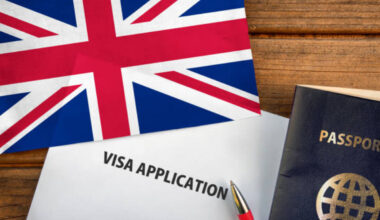Do you want to earn more in a thriving economy? Consider moving to the Netherlands! The Netherlands work visa for immigrants allow you to explore options to relocate and improve your livelihood in the Netherlands.
In Europe, the Netherlands is a popular destination for skilled professionals, entrepreneurs, and workers seeking new challenges.
For immigrants seeking a good salary and a high quality of life, the country offers high wages, a strong economy, and a great work-life balance.
Along with its booming industries like technology, finance, and logistics, the Netherlands is known for its welcoming business environment, strong worker protections, and excellent healthcare.
Due to its strategic location in Europe, the country is also a hub for international companies, making job opportunities plentiful.
Advertisement
Why a Work Visa is Important for Non-EU/EEA Citizens
If you live outside the EU/EEA or Switzerland, you’ll need a work visa to earn money legally. In the Netherlands, there are different types of visas depending on your profession, skills, and experience.
By holding the right visa, you will not only be able to work, but also be able to live and work in the Netherlands for the rest of your life.
Now, let’s explore the different types of work visas available in the Netherlands.
Types of Work Visas in the Netherlands
1. Highly Skilled Migrant Visa
In the Netherlands, you can earn a lot of money if you apply for this visa and have specialized skills. The visa allows recognized Dutch employers to quickly hire non-EU workers in fields such as IT, engineering, and finance.
Best of all? It’s your employer’s responsibility to handle the application process, not you!
Requirements:
-
A job offer from a recognized employer
-
Minimum salary requirement (€3,672–€5,331 per month in 2024, depending on age)
-
Relevant qualifications and experience
2. EU Blue Card
High-skilled professionals interested in working in the Netherlands and possibly moving around Europe may find the EU Blue Card to be another option. While it’s a bit more restrictive than the Highly Skilled Migrant Visa, it offers greater flexibility.
Requirements:
-
A job offer of at least one year with a Dutch company
-
Minimum salary of €5,867 per month (as of 2024)
-
A recognized university degree (at least a bachelor’s)
3. Startup Visa
Have you got a great business idea? An approved facilitator (business mentor) can help entrepreneurs launch their businesses in the Netherlands through the Startup Visa. As long as your startup succeeds, you can obtain a self-employed visa and continue working in the Netherlands.
Requirements:
-
A solid business plan
-
Collaboration with an approved facilitator
-
Proof of sufficient financial resources
4. Essential Startup Personnel Visa
It is common for Dutch startups to need top talent in order to scale their businesses. If you are a skilled worker seeking employment at a Dutch startup, this visa may be your ticket in. The salary threshold for the Startup Migrant Visa is lower than that for the Highly Skilled Migrant Visa, so startups can attract international talent more readily.
Requirements:
-
A job offer from a Dutch startup
-
Equity compensation as part of the salary package
-
Minimum salary of €2,801 per month (2024)
5. Intra-Corporate Transfer (ICT) Visa
The ICT Visa eases the transition from a multinational company to its Dutch branch if you are already employed by one. A manager, specialist, or trainee seeking international experience while continuing their employment with the same company may benefit from this visa.
Requirements:
-
Employment with a company outside the EU for at least 3 months
-
Transfer to a Dutch branch as a manager, specialist, or trainee
-
Minimum salary requirement (varies by role)
6. Seasonal Work and Short-Stay Work Visas
Do you wish to earn an income in the Netherlands but are not interested in a long-term move? Short-stay visas allow workers in agricultural, hospitality, and tourism industries to work for up to 24 weeks during the season.
Requirements:
-
A job contract with a Dutch employer
-
Work permit approval from the Netherlands Employee Insurance Agency (UWV)
-
Proof of sufficient income and accommodation
There is a work visa for almost every type of immigrant to the Netherlands, from highly paid experts to aspiring entrepreneurs to seasonal workers looking for extra income.
To become a successful businessperson in one of Europe’s top economies, it is essential to select the right visa.
General Requirements for a Netherlands Work Visa
The Netherlands has specific requirements for work visas before you can earn money. The following criteria are generally required for all types of visas:
1. Job Offer from a Recognized Employer
The Dutch Immigration and Naturalization Service (IND) recognizes employers that can offer you a Dutch work visa. The government has approved these employers to hire non-EU workers as “recognized sponsors”.
Employers who are not recognized sponsors may need to take additional steps to obtain your employment permission.
2. Minimum Salary Thresholds
Work visas in the Netherlands are subject to minimum salary requirements to make sure foreign workers are earning a competitive wage. Your experience level, age, and visa type determine the exact threshold.
The following examples show how the percentage will change for 2024, but for 2025 it will increase by a certain percentage:
-
Highly Skilled Migrant Visa:
-
Under 30 years: €3,672 per month
-
30 years and older: €5,331 per month
-
-
EU Blue Card: €5,867 per month
-
Essential Startup Personnel Visa: €2,801 per month
-
Seasonal Workers: Must meet the minimum Dutch wage
3. Educational Qualifications and Experience
The EU Blue Card and highly skilled migrant visas require a university degree (bachelor’s or higher), though not all work visas do. There are also visas that require specific years of relevant work experience.
4. Proof of Accommodation and Health Insurance
You must prove that you have a place to live before moving to the Netherlands. In some cases, your employer may be able to assist with this, or you may need to provide a lease agreement.
Furthermore, health insurance is compulsory in the Netherlands. It takes four months for you to register for Dutch health insurance once you arrive in the country. International insurance may be required until then.
5. Background Checks
Applicants must undergo a criminal background check in order to ensure the safety of the public. Having a criminal record may affect your visa application. Your nationality may also require you to undergo a medical examination.
Application Process
There are several steps involved in obtaining a Netherlands work visa. To help you navigate the process, here’s a step-by-step guide.
Step 1: Secure a Job Offer
-
Obtain a work visa sponsorship from an employer in the Netherlands.
-
Employers should be recognized sponsors or willing to become sponsors.
Step 2: Employer Submits the Application
-
Most work visas are applied for by your employer through the IND.
-
The Startup Visa, for example, requires you to apply yourself.
Step 3: Gather Required Documents
You’ll need to provide:
-
A valid passport
-
Your employment contract
-
Proof of salary meeting the minimum threshold
-
Educational certificates (if required)
-
Proof of accommodation
-
Health insurance coverage
-
Background check documentation
Step 4: IND Processing & Decision
-
A request for additional documents may be made by the IND after reviewing your application.
-
A highly skilled immigrant’s work visa typically takes 2–6 weeks, and a non-skilled immigrant’s work visa typically takes 90 days.
Step 5: Collect Your Visa & Move to the Netherlands
-
An MVV (temporary visitor visa) will be issued if approved.
-
You have two weeks from the date of arrival to pick up your residence permit from the IND.
Processing Fees
The visa application fee varies depending on the type of visa:
- Migrant Visa for Highly Skilled Workers: €350 – €380
- EU Blue Card: €350
- Startup Visa: €350
- ICT Visa: €350
When and How to Apply for a Residence Permit
-
Residence permit applications for those who require work visas are usually processed automatically by the IND.
-
Your residence permit must be picked up at the IND office once you arrive in the Netherlands.
-
Some permits need renewal after a few years.
Working in the Netherlands requires a work visa, but a residence permit ensures your long-term stay. As a result, you may be eligible for permanent residency or Dutch citizenship in the future!
Benefits of Working in the Netherlands
1. High Quality of Life
In terms of work-life balance, safety, and overall well-being, the Netherlands consistently ranks among the best countries. The following are the reasons:
-
Shorter Workweeks – Full-time employees typically work 36–40 hours each week, and many companies offer four-day workweeks.
-
Paid Holidays & Leave – Employees get at least 20 vacation days (often more) per year, as well as paid sick leave and maternity/paternity leave.
-
Excellent Public Transport – There are well-connected trains, buses, and cycling lanes for easy commuting.
-
Diverse & Inclusive Society – In the Netherlands, English is the primary language of many workplaces, thus making the country an international hub.
2. Social Security Benefits
As soon as you start working in the Netherlands, you gain access to a strong social security system that includes:
-
Health Insurance Coverage – Most employers help their employees enroll in Dutch health insurance, which provides world-class care.
-
Unemployment Benefits – Unemployment benefits can cover up to 24 months of your last salary.
-
Pension System – State and private pension plans ensure financial stability in retirement for workers.
3. Pathway to Permanent Residency & Citizenship
Considering a long-term stay in the Netherlands? The following are the steps that lead to citizenship and residency in the country:
-
If you live and work legally for 5 years, you can apply for permanent residency.
-
You can apply for Dutch citizenship through naturalization once you have lived in the Netherlands for five more years (or ten in total).
-
Dutch citizenship allows you to work and live anywhere in the EU!
Challenges & Common Mistakes to Avoid
1. Visa Rejections & How to Prevent Them
Rejection of your visa can cause delays or even ruin your plans. Among the most common reasons are:
-
A missing document or incorrect form will result in an incomplete application
-
Not meeting salary requirements – Always check the latest salary thresholds
-
Employer not being a recognized sponsor – Make sure your employer is IND-approved
What can be done to prevent it?
Make sure your documents are accurate, choose an IND-recognized employer, and submit your application well in advance of your intended start date.
2. Employer Sponsorship Issues
Workers who are not sponsored by a recognized sponsor or whose employers do not meet visa requirements face problems.
The solution?
Verify that your employer is listed as a recognized sponsor on the IND website before accepting a job. They must go through extra steps to sponsor you if they aren’t.
3. Legal Obligations After Obtaining the Visa
Once you get your work visa, you must:
-
Register at the municipality (gemeente) – You’ll receive a BSN (citizen service number) for tax and employment purposes.
-
Take out Dutch health insurance – Must be arranged within 4 months of arrival.
-
Follow visa conditions – If you change jobs, your new employer must apply for a new visa if required.
A violation of these rules could result in fines, the cancellation of a visa, or even deportation.
Conclusion
The Netherlands is an excellent destination for professionals, entrepreneurs, and workers seeking better career prospects and high quality of life.
In addition to a strong economy and a balanced work-life schedule, the Netherlands also offers an easy path to residency.
Need More Information?
-
Support is available through expat communities and professional networks.
-
Visa issues can be avoided if you start planning early!
Do you want to work in the Netherlands? Are you ready to start your journey? Don’t wait any longer! Take action now!





